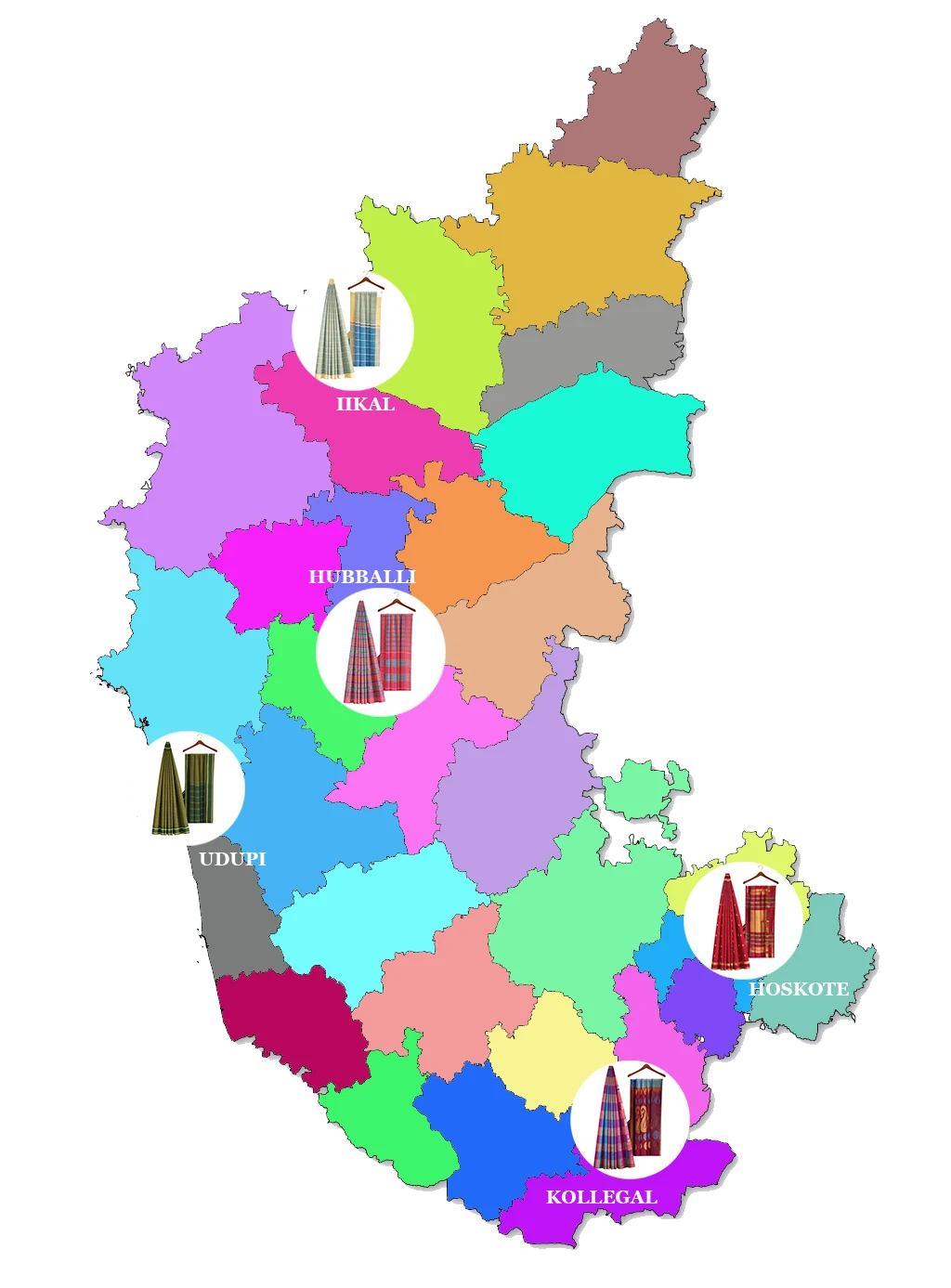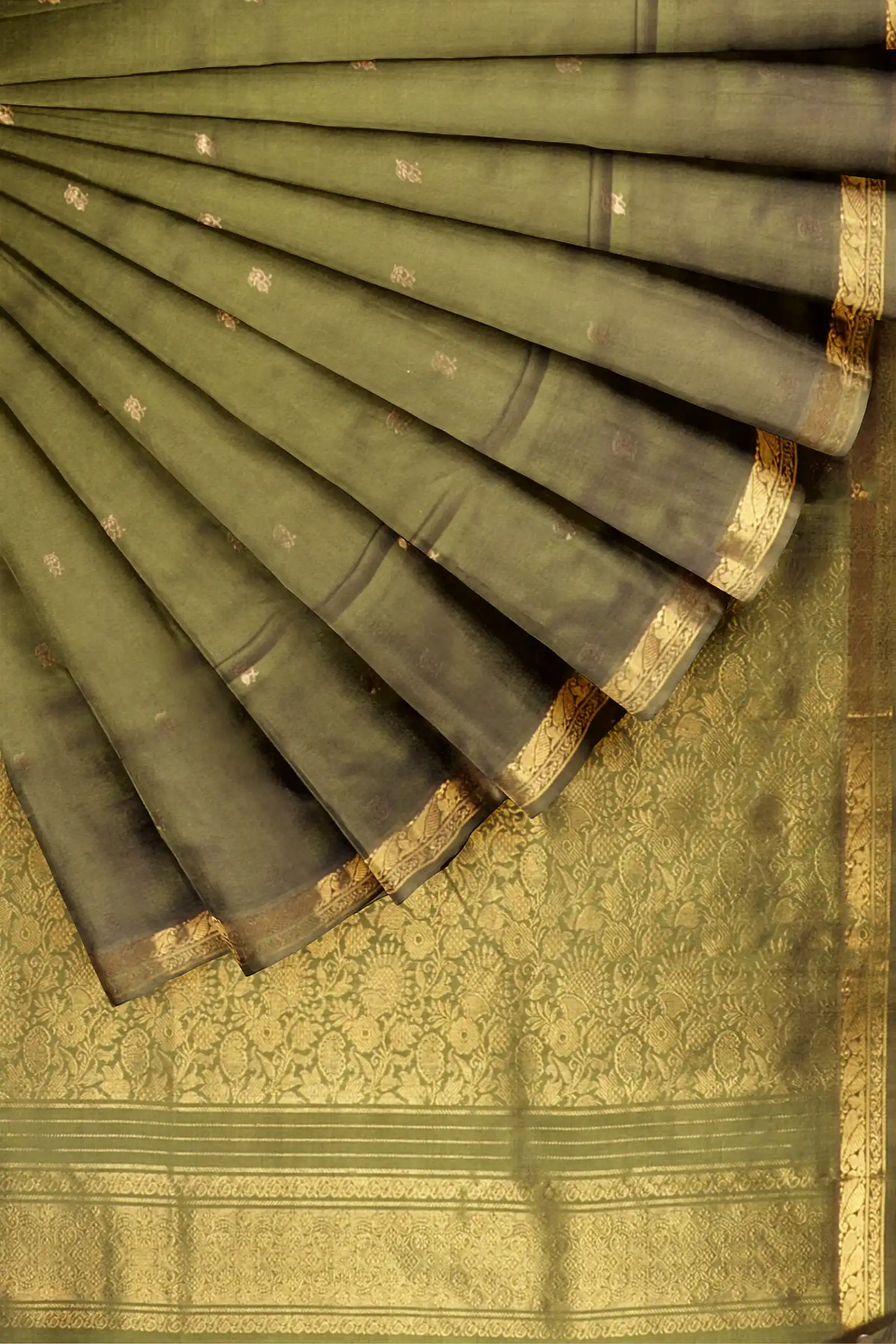Explore the collection of original handcrafted, handloom sarees of Karnataka. These timeless fabrics are woven together by artisans with intricate skills and passion for their craft. If you love handloom sarees, this is the place for you! We want to promote the marginalized handloom weavers of the state and their magnificent craft by bridging the gap between the weavers and the consumers. The rich, intricate and age-old weaving traditions of our country are fading day by day. We want to restore the craft and nurture the craftsmen behind the weaves. Priyadarshini is an umbrella for all traditional handloom clusters across Karnataka.
 Our Products
Our Products 
Prosperity of
The Weaver & The Corporation
The Karnataka Handloom Development Corporation was established in 1975 with the objective of providing support to weavers. Today KHDC has 13000 handlooms under its wing. KHDC work ceaselessly to encourage and support hundreds of thousands of weavers. Revive ancient designs and weaves and integratethem into today's lifestyle.
It's our aim to improve the economic and social status of the weaver by achieving and maintaining quality at all levels of production which will then ensure the well being of the corporation.
Read More
 Our Best
Sellers
Our Best
Sellers 
Anekal
Anekal is a beautiful town known for its handwoven silk sarees. The sarees are light to carry and come in vibrant colours with beautiful zari work and intricate pallu designs.
Kollegal
Well known for its handloom silk saree industry, Kollegal’s nickname is Silk City. Kollegal traditional silk sarees for generations are Devangas and Padmasalvis.
Melkote
Melukote, a picturesque town, has a lot of families involved in silk-making. These sarees are a silken wonder woven by weavers in the region, giving it a magical touch.
Hoskote
Hoskote, a weaving space near Pavagada Taluk in Karnataka is recognized as one of the silk hubs of Karnataka. Hoskote is also well known for weaving woollen kamblas.
Why KHDC
PROVIDES LIVELIHOOD
For more than 10,000 handloom weavers across the State
QUALITY
Pure cotton yarn and silks Used as raw materials
ECO-FRIENDLY
Uses only AZO free chemicals and vegetable dyes
SOCIAL RESPONSIBILITY
Ensures no child labour Is involved at any stage of its operation
PRESERVE
Age-old tradition off fabric weaving

 Places of Traditional & Cotton Silk Sarees
Places of Traditional & Cotton Silk Sarees 

Traditional Silk Sarees
Sampangi rama nagara
Ramanagara Silk Cocoon Market is Asia’s largest selling about 50,000kg of cocoon every day and all of it is freshly cultivated by farmers. The area sprawls with traditional silk artworks and fabrics and the sarees are mesmerising. The government has elaborate monitoring systems to make sure that the sericulture farmers get the deserved rates. There are many silk clusters in Ramanagara dedicated to hand-weaving the famous Mysore silk sarees.
Traditional Silk Sarees
Thyamgondlu
Thyamagondlu is a village in the state of Karnataka in southern India. It is located in the Nelamangala taluk of Bangalore Rural district. There are many weavers who are still into the traditional craft of saree weaving in this region. The region also crafts silk sarees that are sold in various cities of Karnataka. The quality of silk sarees is high and the fabric is weaved with fineness and utmost care by the weavers belonging to this area.
Traditional Silk Sarees
Chintamani
There are a lot of silk handloom weavers concentrated in the southern part of the state and there are more than 1000+ silk handlooms working for Karnataka Handloom Development Corporation. Artisans in Chinthamani have over five decades of experience in silk saree weaving. Chinthamani is known for its fine silk saree crafted by these experienced artisans.
Traditional Silk Sarees
Kikkeri
Kikkeri is a small town in Krishnarajapet, Mandya. Many marginal and small-hold farmers are into sericulture here which is silk culture. The sarees from kikkeri are also known for their vibrant colours and lightweight feature. There are a lot of artisans and skilled workers who are into crafting silk sarees in Kikkeri. Mandya is also famous for Kodiyala sarees.
Traditional Silk Sarees
Dommasandra
Dommasandra is a village with a population of around 10000. About 68% of the people earn their living by crafting and weaving traditional silk sarees. For many weavers here, the occupation is carried on for many generations. Many of them started weaving from a very young age learning from their fathers. Handloom weaving is fading day by day and many artisans are starting to let go as they do not get paid well. Many try to still continue that craft’s wisdom so that it’s not lost.
Traditional Silk Sarees
Melukote
Melukote, a picturesque town, has a lot of families involved in silk-making. The process is tedious and goes through a lot of processes. Weaving silk sarees is something that the skilled weavers of Melukote have been carrying down for over three generations.
With beautiful butta motifs of varying patterns like floral and mango, Melukote sarees are a silken wonder woven by weavers in the region, giving it a magical touch. These sarees are known for their intricate work and the artisans believe that the texture of the fabric is finer as compared to those woven on power looms in factories and the designs remain timeless and true to the age-old traditions. The Mysore Silk Board Authority provides the weavers with raw silk yarn which the skilled weavers transform into traditional hand-woven silk sarees.
Traditional Silk Sarees
Anekal
Anekal is a beautiful town known for its handwoven silk sarees. The sarees are light to carry and come in vibrant colours with beautiful zari work and intricate pallu designs. One can find exquisite motif patterns like a peacock, jasmine, mango on these timeless fabrics. Known for their vibrant colours, Anekal sarees come in magenta, red, white, green, turquoise with beautiful golden zari.
Traditional Silk Sarees
Hoskote
Hoskote, a weaving space near Pavagada Taluk in Karnataka is recognized as one of the silk hubs of Karnataka. These silk sarees were quite famous in the earlier days and is lesser known today. Pure zari is used in the pallu and border of these saris. They are coveted for their fine fabric and feel. Hosakote is one of the bigger handloom clusters in the state and has more than 200 handlooms that are dedicated to weaving silk sarees. Hosakote is also known for weaving woollen kamblas.
Traditional Silk Sarees
Kollegal
Well known for its handloom silk saree industry, Kollegal’s nickname is Silk City. The region weaved saris for the Maharajas of Mysore in the olden days and is famous for reeling and twisting silk and producing its own raw silk. The backbone of weaving Kollegal traditional silk sarees for generations are Devangas and Padmasalvis, prominent weaving communities there. Kollegal Silk Sarees are soft silk sarees produced in pit looms. Today, weavers there are capable of weaving with 240 hooks Jacquard for producing elaborate designs with bold colour pallu using tie and dye warp with Rekhu Pulling Technique. Kollegal Silk Sarees are famous for their design and originality.
Cotton Silk Sarees
Udupi
Woven using the best quality single-ply cotton yarns for both warp and weft, Udupi sarees are woven by artisans of Dakshina Kannada and Udupi. A favourite traditional saree of women in the Southern Karnataka region, the fabric is well suited for the humid climatic conditions of the Tulunad region. Udupi sarees weaving practice went through a decline a few years back when power looms came into place. The age-old traditional weaving techniques started fading due to negligence. The sheer effort of a Trust by the name Kadike led to the revival of Udupi Sarees. These sarees are sought after for their lightness and flexibility.
The Udupi sarees come into two types :
- Check design in body with solid border and plain body with butta designs.
- With a varied combination of bright colours on its borders and pallu, these handloom sarees woven by skilled weavers had to tread a long journey.
Cotton Silk Sarees
Hubballi
Crafted from the ancient weavers of Gajendragarh, Karnataka, Hubli Cotton Sarees is a pure, lightweight fabric that is draped with simplicity just like the Ilkal sarees. The most elegant thing about this saree is how the pallus come in two reversible colours- having two pallus on either side. The Hubli Saree was revived by Dr. Hemalatha Jain who worked relentlessly to bring back the ancient weave after she found a 103-year-old Hubli saree from an ancient weaver.
Hubli sarees are worn by married women in the countryside of Karnataka. Traditional sarees have an elongated flower design that’s adorned with bold and bright borders. These symbolize beauty and elegance and the pattern that runs through the border is called “gadi dadi”. This pattern can also be seen in Narayanpeth and other south Indian sarees.
Cotton Silk Sarees
Ilkal
Hailing from the district of Bagalkote, Karnataka, Ilkal sarees are intricate yet simple sarees that depict vibrancy and humbleness in harmony. Ilkal is a small town with an ancient weaving cluster that dates back to the 8th century AD. An exclusive technique of Ilkal sarees is that the body warp and the pallu warp are weaved separately and then joined together. This knotting craft is called ‘topi teni’. A play of colours on the border, pallu and body makes this piece of handloom saree timeless. While the border and pallu adorn the same colour, the body warp will be a contrasting colour. The kondi technique gives these broad borders rich and solid colours. A mix of cotton, silk or pure silk gives Ilkal sarees its rustic look.
Vocal For Local
"Priyadarshini" the brand under which KHDC markets the hand woven fabrics is today synonymous with handlooms of exceptional quality and beauty, not in India alone but in the global market as well as a result of the seamless blending of an ancient heritage with contemnporary fashion trends.








